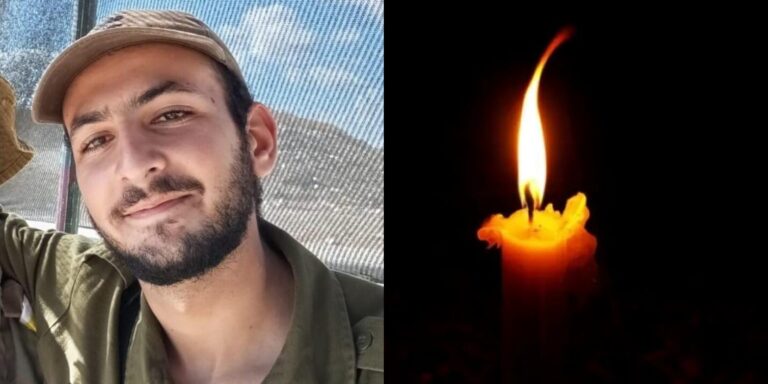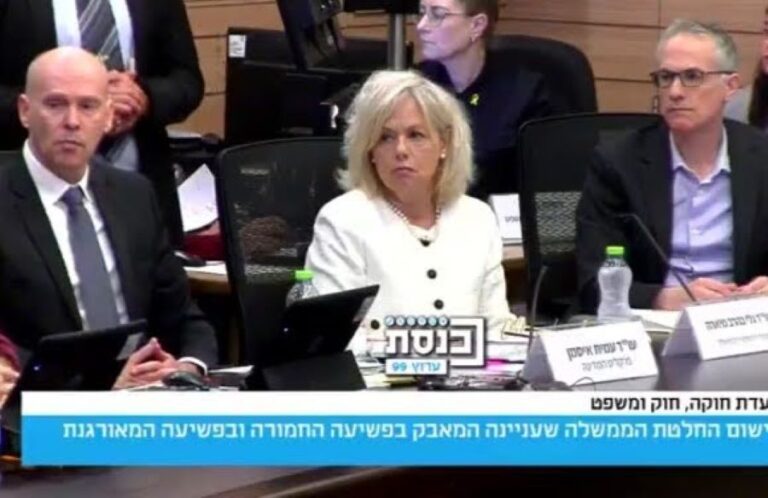 Written by Rabbi Avraham Berkowitz (a Chabad Shaliach in Moscow) for Chabad.org:
Written by Rabbi Avraham Berkowitz (a Chabad Shaliach in Moscow) for Chabad.org:
When I heard the sad news last week that Rabbi Noach Weinberg, the founder and rosh yeshivah (dean) of Aish Hatorah, had passed away, I knew I had to travel to Jerusalem to offer my condolences to his family and students.
I had to pay my last respects to a unique leader of the Teshuvah (“return” to observant Judaism) movement, one of the rare few who’d practiced Jewish outreach early on. Rabbi Weinberg’s personal outreach, and the organization he created, helped thousands of Jews find their ways back to the love of Torah and the beauty of Jewish observance.
But I also carried an important message from Rabbi Weinberg, which I needed to relay.
Shortly before Rabbi Weinberg was diagnosed with the illness which ultimately took his life, I was shopping in Jerusalem, near the Kiryat Belz neighborhood, at a large supermarket called Shefa Shuk. I saw an elderly rabbi pushing his cart down the aisle. He seemed to be struggling to locate some items and I offered my assistance. After he accepted, I helped fill his cart with the items his wife had put on his shopping list. As we continued to speak, I realized that I was helping Rabbi Noach Weinberg, the celebrated Rosh Yeshivah of the Aish Hatorah institutions.
Thus began a particularly open and engaging conversation between a 78-year old Rosh Yeshivah and a 31-year Chabad-Lubavitch shliach (emissary) to Moscow, which I will forever cherish.
Both of my parents became “returnees” to Judaism in Jerusalem in the late sixties. My mother was one of the first students in the nascent Neve Yerushalayim girls seminary, and my father was a student for many years at the Yeshivat Torah Ohr, learning under Rabbi Pinchos Scheinberg, may he be well. Both these institution were associated with the “Lithuanian” or non-chassidic orientation.
While learning in the community kollel (yeshivah for married men) in Detroit, my father searched for the most Talmudically rigorous school for us and found it in the local Chabad-Lubavitch cheder. My childhood was thus an interesting blend of Lithuanian and Chasidic influences and I made it a personal mission to uncover the relationships and the interplay between the two.
I had once heard that Rabbi Weinberg had visited the Lubavitcher Rebbe, of righteous memory, before setting out on his Jewish outreach path, and I wanted to hear more.
“Is it true that you met the Lubavitcher Rebbe?” I asked.
“Of course!” Rav Noach answered. “In those days everyone who wanted to get involved in kiruv (outreach) sought the Rebbe’s advice and blessing.”
He told me how his older brother Rav Yaacov – whom he held in great esteem and who later became Rosh Yeshivah of the Ner Yisrael Yeshivah in Baltimore – would visit the Rebbe’s office weekly in the 1940’s to receive materials and instruction, along with travel money, for the weekly “Wednesday Hour” Released Time classes for public school kids which the Rebbe spearheaded and personally administered. Rav Yaacov was very taken by the Rebbe’s encyclopedic Torah knowledge.
Rabbi Weinberg related that his father, Rabbi Yitzchak Matisyahu Weinberg, came from a chassidic backround – he was a Slonimer chassid, and a nephew and grandson of the Slonimer Rebbes. In 1929 he had to flee the Holy Land after a tragic accident in his mill when an Arab girl fell to her death. Fearing revenge from the local populace, Rabbi Weinberg and his wife grabbed their two younger children, Yaacov and Moshe, and fled to Egypt, leaving their two older sons behind. Eventually they arrived in America, where Noach and a sister were born.
After the sixth Lubavitcher Rebbe, Rabbi Yosef Yitzchak Schneersohn, of righteous memory, arrived to the United States in 1940, Reb Matisyahu began to visit the Rebbe regularly and even asked him to arrange for someone to learn chassidut (chassidic teachings) with his children. In those times in particular it was considered perilous to raise a Torah observant family in the United States, and Reb Matisyahu sought the yirat shamayim (“awe of G‑d” and religious commitment) that the teachings of Chassidism would impart his children.
Eventually Rav Yaacov went to learn in the Rabbi Chaim Berlin Yeshivah under the famed Rabbi Yitzchak Hutner, where he chose the “Lithuanian” path, followed later by his brother Noach. Their father, Rabbi Yitzchak Matisyahu, passed away in 1945, when Rav Noach was only 15. Their older brother Moshe remained a Slonimer Chosid with close ties to the Lubavitcher Rebbe, and accompanied his brother Noach to meet the Rebbe in 1958.
Needless to say, I felt privileged by all this information, and listened, transfixed. Somehow, though, we had made our way to the register, even while stopping to talk every few feet. Rabbi Weinberg paid for the groceries and, still engrossed in our conversation, we walked out together. After loading the groceries into his trunk, Rabbi Weinberg invited me to sit in his car.
Gently nudging the conversation back to that night in the Rebbe’s study, I asked Rabbi Weinberg, “What did you speak about with the Rebbe?”
Rabbi Weinberg told me that in those times it was highly unusual to become involved in reaching out to non-observant Jews, and this type of activity was often frowned upon or even condemned by many leading yeshivas. Lubavitch was the trailblazer, he said, but slowly a few others had started to combat the great fire of assimilation tearing at the Jewish People. In 1953 he – Rabbi Weinberg – traveled to Israel by boat to speak about this with the Chazon Ish, who passed away before his boat arrived.
Later he became a salesman for his brother’s company and traveled to small cities throughout the United States to rustle up business – and discovered Jews of all kinds who were distant from their heritage.
Upon meeting the Rebbe, Rabbi Weinberg said, he asked the Rebbe for a formula to reach alienated Jews.
The Rebbe told him that he should reach fellow Jews through their neshamah, their soul, by sharing with them the teachings of Rabbi Israel Baal Shem Tov (the founder of Chassidism), and that he, Rav Noach, should also begin learning chassidut regularly in order to inspire his own service of G‑d.
Rabbi Weinberg told me that, out of respect toward the Rebbe, he listened but remained silent, since he followed a different approach and could not agree. Later he went back to receive the Rebbe’s blessing after he got married.
Rabbi Weinberg then reflected that although initially chassidut was indeed not taught in Aish Hatorah, the yeshivah had since incorporated into its curriculum some of the principal ideas of Chassidism. Some of the yeshiva’s teachers are Chassidim as well, he added.
On this topic, I spoke to Rabbi Weinberg candidly about how pained I was from seeing discord in some communities between his students and Chabad. Rabbi Weinberg told me again how he recognizes the great work of Lubavitch in leading the Teshuvah movement and said that many of the students who learned at Aish Hatorah were set on their Jewish path – and were still connected – with Chabad rabbis, and that many students who began at Aish are now Chabad-Lubavitch chassidim.
He and I shared anecdotes with each other, both positive and negative, about some of the differences. (The conversation also veered off to some of his earlier attempts, in the ’60’s and ’70’s, to create various yeshivas and organizations.)
But, he concluded, it is high time to set any differences aside, and focus on the commonality and appreciate each other’s roles in Jewish outreach.
To hammer home his point about the positive interplay between his work and Chabad, he shared with me the story of his first baalat teshuvah (“returnee”), a story I finally heard repeated again, in greater detail, in his very modest apartment in Jerusalem’s Kiryat Sanz last night as I sat with his eight sons, all rabbis and scholars in their own right:
In the early 1960s a young woman in Jamaica, whose mother was Jewish and her father a former priest, began to read the bible in her home and became fascinated with Judaism. With no options for her on the island, she somehow obtained a ticket from the Jewish Agency to fly to Israel to live on a kibbutz. After some time on the kibbutz she recognized that her goal of exploring Judaism was not being realized, so she wrote a letter addressed simply to “The Chief Rabbi of Meah Shearim, Jerusalem” and dropped it into the mailbox.
The woman’s letter made its way to Rabbi Amram Blau, the head of the Neturei Karta group who lived in Meah Shearim and, since it was written in English, lay on his desk until someone could decipher it. Eventually Rabbi Blau passed on the letter to Rabbi Weinberg, who was considered the local American. Rabbi Weinberg read her plea, and went to the kibbutz to meet her. Sensing her commitment to making a full return to Judaism, Rabbi Weinberg invited her to live in his home along with his growing family, which she did for a year while becoming fully observant.
This girl eventually married a brilliant student learning in Kfar Chabad and today, as Chabad-Lubavitch Chassidim, they, too, have helped hundreds along the path of Teshuvah…
We had been sitting in the car on Yirmiyahu St., with the motor running, for more than an hour. I could sense that the Rosh Yeshivah, who’d experienced so much during his lifetime, was tired, and suggested that we continue another time.
Rabbi Weinberg agreed, but said that he found the conversation very important, an expression of Divine Providence, and invited me to come to his home next time I’m in Israel to continue it.
After giving me his home and cellphone numbers, the Rosh Yeshivah repeated that he appreciated the opportunity greatly and we both expressed our hopes that it would eventually lead to more ahavat yisrael and unity among Jews.
After thanking him, too, I went on my way.
Rabbi Weinberg fell ill shortly afterward and, due to me living on shlichut in Moscow, that meeting sadly turned out to be our only one. But I feel that the message and the content of our conversation must be recorded and shared to further the unity between fellow Jews.











26 Responses
Deleted.
Isn’t it amazing that everything ever written by a Lubavitcher is about Chabad? Even a hesped on a litvishe adam gadol!
When they write about the gadlus of an individual, it always a main focus, how that individual related to the Lubavitcher Rebbe.
That is a beautiful story. And there are so many stories like these. If we could see our way toward underlining highlighting and emphasizing our similarities as Shomer Shabbos Jews, who are machshav the pintele Yid and mitzvos as the connector shamayim, and importantly, stop calling names and denigrating — as it is said, “Shfoch Chamascha Al HaGoyim” — save your wrath for them, maybe we could bring — active verb — Mashiach bmheira, Amen.
Thank you YWN for posting this article. I”YH, this will bring all Jews and the Geula closer.
#1,2,5.
Sadly, you seem to be missing the entire ikkar of this article. The author (who is clearly Lubavitch) was trying to bridge a gap between Lubavtich and the rest of the frum world. Your response was to belittle Chabad. Maybe instead of criticing other people for being “intolerant”, you re-read your own posts and see who the intolerant people are.
This is one of the main reasons I gave up being “orthodox.” So much nastiness. So many disagreeable disagreements. People seem more concerned with bugs in their strawberries than loving their fellow Jews and treating our fellow man with respect. The Rabbi in Moscow wrote a beautiful piece with lessons for all of us and the next thing you know, the comments lead to Jew bashing. I gave up the black hat and long black coat for a world in which we find the good in each other. The Al-Chayts in the Yom Kippur Machzor are all about our interactions with each other and our excesses in life and not about bugs in strawberries. So maybe Hashem wants us to be careful about what we eat, and make sure the mezuzah scrolls are perfect, and put our shoes on in the proper order— but I am guessing he wants us to focus more of our efforts on how we treat and feel about each other. The article was a breath of fresh air–I just wish I had not read the comments… it seems like not much has changed since I left the halls of the orthodox world three years ago. So sad. The Third Temple seems like a fantasy.
To comment number 1.
Just for the record, I’m Lubavitch and I have a Mishna Berurah in my home.
I agree with rbloom.
How sad it is to read such an inspiring article only to have yiddin completely miss point. The Rosh Yeshivah was saying very clearly to this Chabadnik that we need to focus on what unites us as Jews, particularly in the area of kiruv.
Thank you YWN for posting this article!
lovejews – I believe that you are dealing with myriad other issues – but I do believe that I made my point – and I have asked YWN to remove my posts. I wish you well – and hope that you won’t eat too many bugs.
Love,
Furhatone
Can someone please tell me about Reb Moshe Weinberg ( brother of Rav Noach tz’l), He use to give a daf yomi shuir in Far Rockaway and made aliyah to Israel.
They were all great men and illuminated the darkness of this generation!
To #6: You are right in the fact that there are individuals who are quick to judge and criticize others for their differences. This is their weakness and their responsibility to work on it. What I don’t understand is how you claim to have moved into a non orthodox “world in which we find good in each other” yet you have managed to denounce the entire orthodox world? You seem to have a geniune understanding of what Ahavas Yisroel is and how it should be practiced, yet where is your Ahavas Yisroel when it comes to frum society? Surely just as you see falacies in the frum world you also see them in your new non-orthodox world too. Why such harsh judgement on the orthodox? If you know, as you say, that “Hashem wants us to focus more of our efforts on how we treat and feel about each other” then stand up today and do it! (And that should include orthodox Jews!) But why should that mean that you throw away so many of the beautiful qualities of our Torah values because some people don’t live up to your expectations? Think about it.
To comment No. 6. The Lubavitcher Rebbe would strongly disagree with your comment that you posted, as would every single tzaddik and gadol hador who has lived for the past 3,000 years. The Jewish soul needs both types of mitzvos and the world needs both types of mitzvos. The Rebbe, as you know, simultaneoulsy promoted strict observance of mezuzah, shabbos, etc., while demanding the highest level of ahavas yisroel. The fact is, people sometimes more easily grab onto mitzvos that involve man and G-d because it is sometimes hard to deal with interpersonal relationships in an honest way or to face one’s prejudices honestly. It’s the proverbial tzaddik in pelz. The dysfuntion in the Jewish world, frum and not frum (let’s not forget how bad it is in the latter too), is in part BECAUSE we are in geulah. It would be a shame to acknowledge simultaneously the ideals of our tradition and what they mean and then believe as an individual you can drop it all because you think others aren’t upholding their end of the bargain. The Torah way is to believe you are a partner with G-d, first and foremost. He wants your tefillin, mezuzah and shabbos, as he wants you to love your brothers and sisters (his children). You probably know that the Tanya teaches that the PATH TO AHAVAS YISROEL is working on oneself and viewing one’s body with scorn, while viewing one’s OWN NESHAMA as primary (using the learning of Torah and the mitzvos as both a means and an end), which will in turn allow one to view his fellow Jew not in an external way (the way he looks, his actions, etc.), but at his core . . .at the “soul level”. It’s not just chassidus . . . all of the Torah out there says in some shape or form that you need Torah in order to have proper Ahavas Yisroel.
By the way, there is great irony to your statement that the Third Temple is a fantasy with the sensless hatred that goes on . . . you say it as someone who clearly believes we could have the Beis HaMikdash if we corrected those issues! If there is so much riding on correcting the problem of sinas chinam, how could you abandon your brothers and sisters in those efforts? That doesn’t sound like ahavas yisroel to me.
A beautiful and highly informative article written with warmth. Thank you for sharing this with the readers.
#6
Your point is understood, but Don’t forget that ‘Cardiac Judaism’ alone is not pleasing to Hashem either. That’s not my opinion – its His.
No 11- You make some excellent points and I have worked on not letting my disappointment try to govern how I treat others, including frum Jews. I want to clarify two things, though. One, I am not against people who are frum. When I go to shul, I go to a frum shul. When I learn Gemurah each week, I learn with a frum rabbi. I maintain very close relationships with many people in the frum community. And I stand up against blatant anti-religious sentiment in the secular world. But that does not mean I need to stick my head in the sand and pretend that there is not a pervasive problem of judgmentalism and lack of ahavos yisroel in big parts of the frum community. I heard enough anti-Chabad, anti-Aish, anti-modern orthodox, anti-African American and anti this and that to last me a lifetime. It was not one or two. It was pervasive. I believe that the failure to speak out has resulted in very little improvements in that area. My views do not derive from hatred or anything closely related to that. Quite frankly, it is hard for most people to think they have the ultimate truth and not judge others who do things differently. That is part of being human. I have learned in yeshivas in Israel and the U.S. I learned five days per week in ultra orthodox settings for 10+ years. There is a tremendous amount of beauty in that world. I did not just throw out the Torah, G-d forbid. But there is a tremendous amount of judgmentalism, too, and I choose to believe that the system as it has evolved over the past 50 years unwittingly encourages this type of behavior, even in good people. My only expectation of people is that they be good to each other. None of us are perfect.
Today, I remain a Jew. Not a Reform, Conservative or Orthodox Jew, but a Jew. The suggestion by No. 12 that I dropped Judaism is beyond recognition to me (ironically, my non-religious friends still affectionately refer to me as their rabbi). I do not need to stack up my mitzvahs to see if I am ahead or behind people who outwardly look more observant. Hashem knows what I am up to. And he knows I still wash my strawberries very well.
comment #1 I have been in dozens of Chabad homes and your statement is poshut not true. Were it only to be the other way..non Chabad homes should have as many Chassidishe seforim as Chabad has non Chassidish. Even for someone not bahavent with the Mishna Brura, you have been simply motzi shem ra on so many. For someone ke’iluy protecting the kovod of the Chofetz Chaim and to trample befarhesya on Shmiras Haloshon…you need to ask mechilla from Chabad and the Chofetz Chaim
no 15: in my opinion u need to change your focus. the goodness in each & every group (from modern otherdox to satmer & everything in between) far outweighs the ‘anti’ that u may have seen/heard. when a person has an occasional irregular heartbeat the single irregularity sticks out despite the thousands of regular hearbeats. The yetzer hora has an interest in only promoting the irregularities. it is a test for all of us to focus & learn from the goodness of each and every group. each one shines forth in many aspects and by far outshines most of the non-frum, as u should know by now yourself.
Furhatone who has many issues and clearly does not redeem himself with his subsequent comments; maybe he should request those removed too due to their abundance of extreme chesed — the bigger issue is that there is an intelligence missing — you read an article that addresses one topic, but you chap on your own hatred and negativity. I suppose that’s the very definition of sinas chinam.
the statements made by this chabadtzker are patently false (he is not a shaliach b/c eyn shliach l’dvar aveirah) I have learned in Ner Yisroel met Rav Noach on several occasions and know that R’ Yaakov and R’ Noach were both adamantly opposed to chabad, their leader and ideology(in the machos against the lubavitcher in the early 80’s after besmirching the kavod of Maran R’Shach R’ Yaakov’s shmuess is legendary in Ner Yisroel and beyond. Not out of hatred but out of pain of what chabad has become. Also the quotes about R’ Noach saying positive things about chabad are patently false b/c of the Chazakah of eyn odom meysim atzmo roshoh. This a another subtle attempt by chabad to gain legitimacy in the olam hatorah.
#1, I do agree with you, and that is in fact why I left Chabad (first becoming a Litvak and then slowly to the general chassidic direction – some affiliations with Dushinsky and Cleveland-Ra’anana). It is annoying how everything they speak about, everything they learn, and everything they do, is *Chabad*. I don’t see that in any other movement around the world.
However, it is fully logical – regarding #2 – that an article written by, for example, a Kloizenburger chossid about Rav Shach, would mention Rav Shach’s dealings with the Kloizenburger Rebbe. What’s the difference here? No big deal there.
Have to say however, that this specific article is very positive and impressive, and that Rav Berkowitz (the writer) seems to be a very decent person – as are many other Chabadnikim.
#19 asserts that this nice meeting in a grocery store never took place, and accuses the writer of being a liar. 19, your chazaka for emes is in question. You are saying that people had no shaychus with the Luvatcher Rebbe ZTZL? The fact is that tons of Yeshiva bochurim from your neighborhood and their parents wrote and met with the Rebbe for brachos, and danced fervently at 770 before they came back to your nice lawn in Flatbush to puke up their guts. Try re-reading the story above, it was not a piece of doctrine, it was just a nice story about someone who admitted their from “another world,” but had respect for Aish Ha Torah’s leader. Your words are not only uncalled for, but miss the point, and are accusatory of something that does not exist. Good luck in your cardboard grey lifeless world where you are so confident in your sinas chinam, negativity, and lashing out.
Jewshmu has now declared himself brabim to be kofer b’ikkar since he thinks being a shliach to get people to put on Tefilin, which is kneged the whole Torah, is a dvar aveirah. His words.
Once one gets around the sanctimonious rhetoric of
Jewshmu’s post, you cannot but realize the sinas Lubavitch apparent in this individuals ode to “ahavas Yisroel”.Now is not the time nor the place to refute all the so called “avlas” of Chabad or the “fallacious” interaction beetween
Rabbi Avraham Berkowitz and Rabbi Weinberg.Nor am I going to respond to the so called “besmirching” of Rav Shach by the Lubavitcher Rebbe because here we run in to the problem of what came first,the chicken or the egg.
We lubavitcher are ofen caught in a situation of we are damned if we do and wer’e damned if we don’t.One of the tainus against Lubavitch is that it does not write or talk about other factions of Torah Judaisim in Chabad media.Which may be true but we are not the only ones “guilty” of this crime.Brisk for example are equally culpable of this trait.Finally an article is printed up in a Lubavitcher media publication about someones meeting with Rav Weinberg Z”L and we are accused of “another subtle attempt by chabad to gain legitimacy in the olam hatorah.”
I would like to know of other attemts by us to make “subtle attemts to gain legitimicy in the Olam Hatorah”.Lubavitch does not look for nor desires acceptence by the type of “oilem Hatorah” that the above poster seems to think that he represents.His “oilom” is populated by sinas chinom and pure unadulterated,good old fashioned hatered and this in a time of sakones nefoshes for klall Yisrol both in the physical and spiritual realms.Some true Ahavas chinom is certainly called for instead of the nit picking displayed by the above poster.
21. and 23. first of all im not from flatbush and what u said was when bummy guys wanted to drink they go to the crown heights which is megalah on chabad more then on anyone else.Second of all i am offended by being accused of sinas chinam but understand it as its the first defence chabad goes to anytime criticism is leveled at them. Regarding Rav Shach i have the recording of him speaking about eretz yisroel of which the lubavitcher never stepped into and was criticized a week later by the lubavitcher for it so nice try with (chicken and the egg, and its not just R’shach). Also before you are medamah lubavitch to brisk realize if you were right which u arent that is not a defence. Finally when i can tell u countless stories of chabad fighting other kiruv organizations such as aish, ajop, Rav goldschmidt in russia, cincinatti and others for power and influence and there lies not sinas chinam but sinas haemes of the olam hatorah and rather trying to be mechadash a new religion based on the lubavitcher
Jewshmu said “R’ Yaakov and R’ Noach were both adamantly opposed to chabad”.Perhaps Jewshmu needs to be reminded that the Yeshiveshe velt is adamantly opposed to R’Noachs and by extension Aish Hatorahs approach to kiruv.R”Elya Svei and R’Shach were open in their condemnation of Aish.
What really irks me is that in spite of Chabad bashing by R’Noach as you claim, and as everyone knows by Aish, and trying to undermine Chabad wherever Aish sets it’s foot,A Chabadnick writes a glowing letter about an individual who you claim to have abhorred Lubavitch,you condemn this individual in the vilest terms.R’Berkowitz was practicing ahavas chinom in the truest meaning of the term.You sir,instead of being dan lekav zchus, have stooped to the lowest form of abhorrent sinas chinom.
Insightful side to Reb Noah zt”l.
Reb Noah was the paragon kiruv leader, he established his yeshivos and organizations including ‘honest reporting’, ‘hasbara alliance’, ‘jerusalem fellowships’, to touch the heart, soul and mind of every Jew he met. Rule #1 of Reb Noah was, BE POSITIVE and look for any path to connect a wayward Jew with his heritage. Through his Jerusalem Fellowship experience he touched on more than 10,000 college students by connecting them to the Land of Israel. He spoke, thought and felt ‘positive’ that there were many pathways to reach spiritual heights. May he be a malitz tov for all of klal yisroel (reform, conservative, orthodox, etcs.)